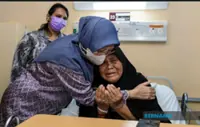
In addition to raising the risk of heart disease, steroids can lead to hair loss, headaches, high blood pressure and impaired kidney function.
DRUGS – whether medicines or supplements – need to be registered with the Drug Control Authority before they can be legally sold in Malaysia.
As such, the Health Ministry’s Pharmaceutical Enforcement Division regularly cracks down on those selling unregistered health products.
At the same time, the Health Ministry, via the National Pharmaceutical Regulatory Agency, has various safeguards in place to help consumers identify the legitimacy of a product.
Among the safeguards is that all certified health supplements must be marked with a hard-to- counterfeit holographic sticker called the Farmatag, which includes a QR code, a gradient design, and holographic serial and personal identification numbers.
The ministry also has a mobile application called Farmachecker so consumers can easily confirm a product’s certification status online.
However, it is unclear if this covers supposedly unsponsored products “vouched for” by fitness influencers or “fitinfluencers” on social media.
One income stream for those with a large social media following is promoting sponsored content to their followers.
Some may inadvertently end up promoting something they should not, such as counterfeit or unregulated medicines and supplements.
The Malaysian Communications and Multimedia Commission (MCMC) has previously said preventing the sale and promotion of prohibited substances is among the online harms they are taking seriously.
The commission has also urged Internet service providers (ISPs) to try their best to prevent criminal conduct on their platforms and promptly remove any such related content, in line with the Communications and Multimedia Act 1998.
But when it comes to medical influencers – influencers who are medical professionals – who promote such substances, more action can be taken against them by their professional governing body, the Malaysian Medical Council (MMC).
MMC member Dr Suhazeli Abdullah says promoting unproven healthcare products is clearly against their code of professional conduct.
As stated in Article 3.4 of the code, the association of a practitioner with any commercial enterprise engaged in the manufacture or sale of any substance which is claimed to be of value in the prevention or treatment of disease but is unproven or of an undisclosed nature or composition will be considered serious professional misconduct.
Dr Suhazeli says he was once asked by a healthcare company to advertise their product on his social media accounts when he had gained about 100,000 followers.
“Luckily so far I have yet to be influenced or have my eyes hoodwinked by the generous rewards,” he says.
Unfortunately, he laments, lately, there have been some medical professionals looking for additional income by accepting similar offers to review or promote healthcare products on their social media accounts.
Dr Amirul Amzar, who is involved with the NGO Medical Mythbusters Malaysia, issues a reminder that the MMC does not have much enforcement powers as it is more of a governing body.
“If the public lodges a complaint against a doctor to the MMC, they will be called and if found guilty, action can be taken against them.
“Please be reminded that the legal capacity of the MMC is very limited.
“Hence, the action taken may be limited to a reprimand, a suspension, or getting struck off from the registry,” Dr Amirul says.
Personally, the family medicine specialist believes stronger enforcement is needed beyond MMC.
“The MCMC may play some role in curbing misinformation regarding health products and supplements, particularly those spread by professionals like doctors,” he says.






































